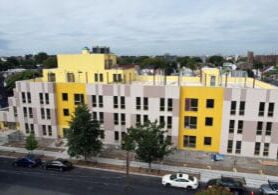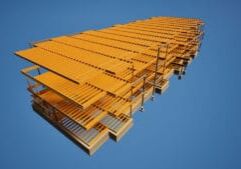The Environmental Impact of Traditional vs. Modular Construction
As the planet's population is growing at a rate of over 1% per year, the toll on the environment has been significant. While people are talking about plastic pollution, ozone depletion, and greenhouse gas emissions, hardly everyone understands the substantial impact of traditional construction methods and benefits offered by modular construction.
According to the Environmental Protection Agency (EPA), 569 million tons of C&D debris were generated in the United States in 2017. Other resources suggest that construction is responsible for 23% of air pollution and 40% of the drinking water pollution.
Construction companies from all over the world are struggling to reduce their impact on the environment. One of the most effective methods is using modular construction.
Less Waste, More Output
One of the biggest problems that traditional construction companies face is waste. The rough estimation is that about 30% of the total weight of building materials is wasted at the construction site.
The basic concept behind modular construction (creating building modules off-site and then assembling them on-site) lowers the amount of generated waste tremendously. According to a study done by the Waste & Resources Action Program (WRAP), off-site construction can reduce waste to 1.8%.
For example, a small 25,000 square foot office building produces about 100,000 pounds of waste. If modular construction is used, the amount can be reduced to about 1,800 pounds. The difference is impressive.
Higher Potential for Recycling
Traditionally constructed buildings generate a substantial amount of waste during demolition. According to the EPA, demolition makes up more than 90% of the total construction and development debris generation.
Modular construction offers a possibility of creating relocatable buildings, thus eliminating the need for demolition when they are no longer needed. Meanwhile, permanent modular buildings have a higher potential for recycling as well. They can be reworked for future projects.
Less Noise Pollution
Since the majority of modular building construction is done offsite in controlled factory environments, noise pollution is minimal.
Excessive noise produced at construction sites isn't just annoying and frustrating, it can lead to hearing loss, blood pressure spikes, sleep problems, and extreme stress, not only for on-site workers but neighbors as well. That's why modular construction is highly beneficial for hospitals, schools, and offices.
Less Energy Waste
Since the time spent on-site with modular construction compared to conventional methods is minimized, so is the energy waste. Construction workers spend less time and energy by doing their job in an unchanged setting without any traditional construction site distractions, such as noise or weather. Accordingly, their productivity goes up considerably.
Additionally, constructing modules in a factory-like setting requires the design to be completed in advance. As a result, fewer change orders are entered during the construction process, thus saving time, money, and energy.
Since modular construction doesn't need as much space as conventional construction methods, the adjustments to the surrounding infrastructure are minimal. Accordingly, the process requires less energy.
As a bonus, it's easy to incorporate such energy-efficient options into modules as occupancy sensors for lights, energy-efficient windows, solar panels, and high-efficiency HVAC systems.
Better Construction Quality
Since modular construction is performed in a controlled factory environment, many mistakes can be avoided. One of the biggest integrity hazards in construction is moisture. Using dry materials inside the factory can prevent moisture entrapment, thus saving energy and reducing material waste.
Fewer Transportation Emissions
With heavy machinery and multiple workers going back and forth to the construction site, the transportation emissions for conventional construction are high.
Since with modular construction, the majority of work is done within a factory, the amount of on-site emissions goes down substantially.
Eco-Friendly Materials
Many modular construction companies focus on using eco-friendly building materials, lowering the environmental impact while reducing waste production. In addition, many other companies have become adept at reusing existing materials, such as freight and shipping containers, to create new buildings, further reducing material waste.
Even though the entire construction industry is trying to reduce its impact on the environment, traditional construction methods are having a tough time competing with modular construction. Its ability to cut waste, offer better construction quality, lower transportation emissions, and reduce noise pollution is virtually unbeatable.
More from Modular Advantage
Behind the Design of Bethany Senior Terraces, NYC’s First Modular Passive House Senior Housing Project
As more developers seek to meet new regulations for energy efficiency, the team at Murray Engineering has set a new record. With the Bethany Senior Terraces project, Murray Engineering has helped to develop NYC’s first modular structure that fully encompasses passive house principles — introducing a new era of energy efficiency in the energy-conscious city that never sleeps.
How LAMOD is Using Modular to Address Inefficiency, Sustainability, and the Future of Construction
As developers, designers, and contractors seek to understand the evolving needs of the modular industry, no one is as well-versed in the benefits of going modular as Mārcis Kreičmanis. As the co-founder and CBDO of LAMOD in Riga, Latvia, Mārcis has made it his ultimate goal to address the inefficiencies of traditional construction.
From Furniture Builder to ‘Activist Architect’: Stuart Emmons’ Unique Journey
Stuart Emmons was fascinated by buildings at a young age. He remembers building sand cities with his brother during trips to the Jersey shore. His father gave him his first drawing table at the age of ten. Today, he is an experienced architect who received his FAIA in June 2025. The road he took is unique, to say the least.
Forge Craft Architecture + Design: Codes, Contracts, and Intellectual Property
Founding Principal and Director of Modular Practice for Forge Craft Architecture + Design, Rommel Sulit, discusses the implications of codes, contracts, and intellectual property on
modular construction.
Eisa Lee, the “Bilingual” Architect
Now as the founder of XL
Architecture and Modular Design in Ontario, Canada, she applies not just her education as a traditional architect but an entire holistic view on modular design. It’s this expansive view that guides her work on being a true partner that bridges the gap between architects and modular factories as they collaborate on the design process.
Tamarack Grove Engineering: Designing for the Modular Sector
The role of a structural engineer is crucial to the success of a modular project, from initial analysis to construction administration. Tamarack Grove offers structural engineering services — project analysis, plan creation, design creation, and construction administration — for commercial, manufacturing, facilities, public services, and modular. Modular is only one market sector the company serves but it is an increasingly popular one.
Engineer Masters the Art of Listening to His Customers
Since founding Modular Structural Consultants, LLC. in 2014, Yurianto has established a steady following of modular and container-based construction clients, primarily manufacturers. His services often include providing engineering calculations, reviewing drawings, and engineering certification
Inside College Road: Engineering the Modules of One of the World’s Tallest Modular Buildings
College Road is a groundbreaking modular residential development in East Croydon, South London by offsite developer and contractor, Tide, its modular company Vision Volumetric (VV), and engineered by MJH Structural Engineers.
Design for Flow: The Overlooked Power of DfMA in Modular Construction
Unlocking higher throughput, lower costs, and fewer redesigns by aligning Lean production flow with design for manufacturing and assembly.
Choosing the Right Ramp
Modular construction offers a compelling alternative to traditional methods for designing and building ADA and IBC-compliant entrances. By addressing the challenges of traditional construction, such as time-consuming processes, unavailable specialized labor, and variable field conditions, modular solutions provide a more efficient, cost-effective, and reliable approach.










